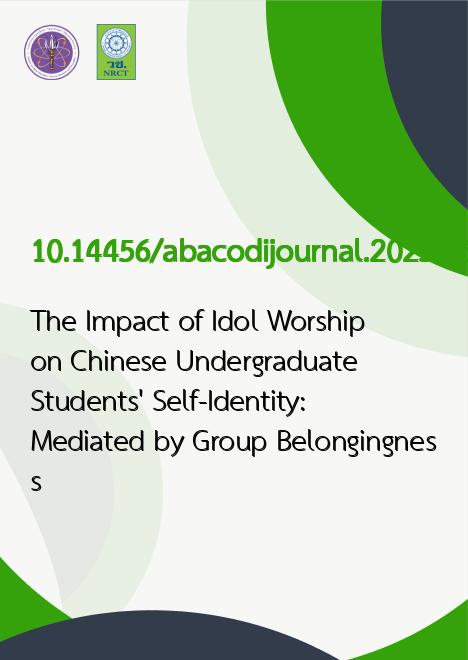
|
The Impact of Idol Worship on Chinese Undergraduate Students' Self-Identity: Mediated by Group Belongingness |
|---|---|
| รหัสดีโอไอ | |
| Creator | Qingran Yang |
| Title | The Impact of Idol Worship on Chinese Undergraduate Students' Self-Identity: Mediated by Group Belongingness |
| Contributor | Davud Shahidi |
| Publisher | Graduate School of Business and Advanced Technology Management - Assumption University Thailand |
| Publication Year | 2568 |
| Journal Title | ABAC ODI Journal Vision. Action. Outcome |
| Journal Vol. | 13 |
| Journal No. | 2 |
| Page no. | 371-386 |
| Keyword | Idol Worship, Self-Identity, Group Belongingness, Chinese Undergraduate Students, Identity Development |
| URL Website | https://assumptionjournal.au.edu/index.php/odijournal/index |
| Website title | ABAC ODI Journal Vision. Action.Outcome |
| ISSN | 2408-2058 |
| Abstract | As Chinese undergraduates face increasing academic, career, and social pressures, developing a stable self-identity is a significant challenge. Understanding factors that may support self-identity development, such as idol worship, is important for promoting mental health and social adjustment among students. This study explored the impact of idol worship on the self-identity of Chinese undergraduate students, focusing on the mediating role of group belongingness. A quantitative survey was conducted among 164 Chinese undergraduate students exhibiting idol worship behaviors, using convenience sampling. The minimum required sample size was calculated using G*Power 3.1 (68 participants) to ensure adequate statistical power, and 164 valid responses were analyzed for reliability. Participants completed scales measuring idol worship, group belongingness, and self-identity, and data were analyzed using SPSS. The results showed that idol worship was positively associated with self-identity, with group belongingness partially mediating this relationship and enhancing students self-identity. These findings indicate that idol worship can support self-identity development through social connectedness, while excessive engagement may pose potential risks. This study deepens the understanding of undergraduate students idol worship culture and its psychological mechanisms and provides a reference for related educational and psychological counseling practices. |